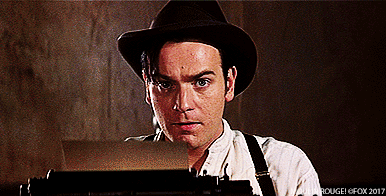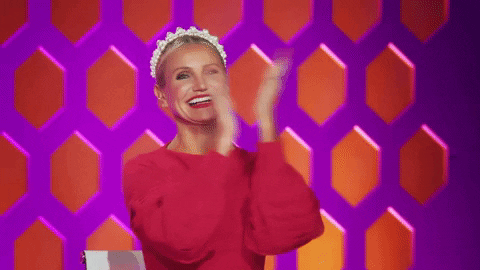The Aerobics Instructor?
And other absurd and irrational ways to fall in and out of love in A Life Less Ordinary!
Dearest faithful readers,
We are three weeks into 2025 and I can now say, tentatively, that the year has got off to a much better start than last January with, as of our last count, no hospital visits so far! Generally speaking, however, the immediate prospects for 2025 are looking pretty grim: a new Trump presidency, endless war, relentless genocides, climate crises, housing crises, wildfires and whatever you’re having yourself.
Welcome to AutCasts, a free bi-weeekly newsletter exploring neurodivergence through cinema’s oddballs, misfits & rebels!
All in all, this little newsletter about movies feels like a rather trivial, and sometimes hard to sustain, pursuit. I have thought many times over the last year of giving up and letting AutCasts disappear into the cyberspace ether of “newsletters that might have been.” But even though I struggle to find the time or motivation to write in the middle of this global dumpster fire, it has been one of the few sources of consistent creative joy I have felt over the last year. So thank you for bearing with me through the silences and the despair and thank you for being here as we tippy-toe into a third year of movie missives.
January is a month of starting fresh, of resolutions, people going vegan, people going sober and committing to all sorts of other virtuous pursuits. But, in the middle of this discontented winter, I thought I’d commit myself to the absurd, the irrational and the surreal with two of my favourite oddball movies from the late 90s: the “love conquers all” optimism of A Life Less Ordinary (ALLO) this week and the fin de siecle pessimism of Being John Malkovich next time. So strap in, or strap on, as we break the laws of (meta)physics with Cameron Diaz and Ewan McGregor in A Life Less Ordinary.1
A Life Less Ordinary is a 1997 dark rom-com directed by Danny Boyle. When Robert (Ewan McGregor) loses his girlfriend, apartment and cleaning job in the same day, he seeks revenge on Mr. Naville (Ian Holm) the head of the corporation that wants to replace him with robots. The intrusion into Mr. Naville’s office escalates to a kidnapping situation when he takes his boss's daughter, Celine (Cameron Diaz) hostage. We soon discover, however, that this unlikely encounter has been orchestrated by two angels Jackson (Holly Hunter) and O’Reilly (Delroy Lindo) who are in charge of human relationships on Earth, and are determined to “help” Robert and Celine find true love, no matter what the cost!
I thought we agreed there'd be no cliches?
Sneaking in quietly between Trainspotting (1996) and The Beach (2000) ALLO feels like the Danny Boyle movie that everybody decided to forget. It has neither the gritty reality of the former nor the desert island fantasy-turned-horror of the latter, but as a teenager ALLO was, hands down, my favourite of all Boyle’s movies. Whole scenes of dialogue became part of my vocabulary and I forced my friends to rewatch it multiple times until, I too, simply forgot about it.
Without my own VHS copy and in that nether time, between DVDs and streaming, ALLO was simply hard to get a hold of. When I rewatched it over Christmas, I realised that I still remembered most of the dialogue as if it had been a play I participated in during high school. With a soundtrack featuring everyone from The Prodigy to REM, The Cardigans and Beck the movie is a time capsule of the grungy, late-90s subculture that I so longed to be a part of.
As a teenager, I found myself identifying with closest with Robert, the failed novelist sporting his Velvet Goldmine hair, who dresses in a faded 1970s vintage shirt, pinkish flares and worn out Vans for most of the movie. He can’t apparently do anything— writing, cleaning or kidnapping—right. And yet, he manages, over the course of the hostage situation, to make Celine fall in love with him. Robert was the prototype for every boy I had a crush on as a teen, just swap writing for music. Unlike Celine, I was too scared to talk, never mind flirt, with any of them.2 I believed them to be so much better than me—cooler, better looking, more interesting—and was certain they would never have had an interest in a gender-confused, introverted, nerd, with a buzz cut and who was firmly in denial of her own queerness. It would eventually become clear to me that the aura of cool which seemed to envelop these boys turned out to be mostly made up of B.O., cheap deodorant and tobacco with a hint of weed. Once I developed the courage to talk to them, I also realised that these boys mostly resembled the red-pilled Kens playing guitar at the Barbies on a beach or explaining The Godfather beat-for-beat at a party.
As for Celine, her rich girl flawlessness and poise, even when she hasn’t changed clothes for over a week, seemed as distant from my own hot-mess-expressness, that she felt as godess-like to me as Robert believed her to be. Rewatching this at 40, Cameron Diaz not only looks incredibly young, but I truly appreciate her “bitch please” attitude to all the men in her life who she treats disdain or open contempt.
But somehow, the angels succeed in getting these two unlikely characters to fall in love, though it’s a hard nut to crack.
The Aerobics Instructor
Robert and Celine are both dreamers inhabiting opposite ends of the class spectrum. Robert, against all evidence to the contrary, remains optimistic about life, love and the prospects for his trashy novel. Celine, at 25 is already hardened against the world and the prospect of finding any fulfilling connection, except perhaps with her credit card.
The more they step out of ordinary life and embrace the chaos that engulfs them, the more they are drawn to each other. Both are misfits and failures in their own worlds and they discover that they have one crucial thing in common: their previous partners both left them for aerobics instructors:
Celine: You have the demeanour of a man whose partner has left him for an aerobics instructor.
Robert: I do?
Celine: But be honest, it was inevitable. You weren’t suited for one another. You dream of something better and she wanted something now, hence the gymnast. Am I right?
Robert, we assume, dreams of making it big as a trashy romance novelist (perhaps writing under a pseudonym because that genre is the firm territory of women writers?). And Celine, we guess, dreams of escaping the demands of social propriety, class and the marriage plot even if she’s unwilling to give up her credit card or the lifestyle afforded by her father’s millions.
In Robert she sees, perhaps, the potential for escape and in the ransom a way to maintain a shadow of her former lifestyle when it becomes clear that her father—if he survives—will cut her off. Robert’s aura of bumbling, soft-boi, masculinity, seems to be the exact antidote to the adulterous misogynists who otherwise surround her. In the end, Celine is the one who breaks out the grand gestures and saves Robert’s life by shooting him through the heart with a bullet of pure love.
Human fucking beings!
In becoming an active participant in her kidnapping, almost from the very beginning, Celine seems to be working through her trauma from when she was kidnapped at 12. In that instance, the kidnappers drained her of a pint of blood a week and sent it to her father. He waited six weeks to pay the ransom, that’s what happens to the victim, she says, as she walks Robert through the stages of kidnapping.
It becomes very clear, when Celine has the chance to flee but doesn’t, that she’s the one in charge. And the more she gets into her role as hostage and kidnapper, the more she begins to enjoy herself. She takes control of a situation which directly parallels her previous trauma, when as a little girl she was at the mercy, not just of her kidnappers, but her father. She achieves revenge against her father who is primarily concerned with the accumulation of wealth and the exercise of power. And in finding a release from the trauma of her past and the mundanity of her present, she lets herself fall in love with a man she would probably never have taken a second glance at.
And you realise that it's absurd and irrational?
At the end of the day, ALLO is a romp that requires the considerable suspension of disbelief and suspicion of anything tied to Christian mandates of holy matrimony. I mean who can really resist Dan Hedeya as a ticked off Gabriel, Stanely Tucci as the jealous ex-boyfriend with a bullet wound in his frontal lobe or Ian Holm as a loathsome millionaire who gets his comeuppance in the end?
And let’s not forget 'O’Reilly and Jackson as the interfering angels who seem to forget that their mission is to make Robert and Celine fall in love, as they push the couple to ever greater extremes before becoming active participants in the kidnapping plot. The chemistry between Lindo and Hunter sizzles throughout as their relationship evolves beyond their professional role as celestial matchmakers. They show tremendous care for each other and it seems only right when they return to heaven as lovers, not just partners. Whatever about the fresh faced and flawless Cameron Diaz, it was sexy and spunky Holly Hunter who really stole my 15-year-old heart!
With the exception of the companionship between Tod (Maury Chaykin) and Felix (David Stifel), ALLO is an overwhelmingly heteronormative movie where love between man and woman, as ordained by God and facilitated by a whole heavenly police department, is the only game in town and it must end in marriage. I will, on this occasion, give it a pass for its sheer absurdity and imagination, stellar cast and its grunge-fuelled soundtrack.
If you liked what you read, please tap the heart 💕 below and consider subscribing (for free) or sharing this essay. As an independent writer it’s the best way to support my work!
In other news, I had a recent essay in Electric Literature celebrating the neuroqueerness of the last season of Bridgerton:
“The season’s misfits, outcasts, abject failures and rebels nudge us towards the possibility that social norms, no matter how rigid, can be bent—even broken—without provoking catastrophe. Discomfort, perhaps, but not the end of the world. As Violet says: ‘living to please others? I imagine it can be wearying at times.’”
You can read the full piece here!
And I had a piece of creative nonfiction featured in the first ever edition of Queer Connections edited by the wonderful
! You can read it here!Thanks for tuning in, best wishes for 2025, and join me next time as we crawl down a sticky portal that takes us straight into John Malkovich’s brain.
In the meantime, how’s your 2025 going? What have you been doing or watching to escape the January blues?
I could not find a single ‘A life Less Ordinary’ Gif on the internet (something which should be remedied) so I’ve included some of my favourite Cameron and Ewan moments from the last 30 years!!
This was my phase where I was desperately trying to convince myself that I wasn’t queer, so even though I had crushes on women, they were very distant and abstract.





I enjoyed your linked piece btw!
Honoured to publish your beautiful words, Aisling. Happy 2025 - I'm looking forward to reading more from you this year! 💕